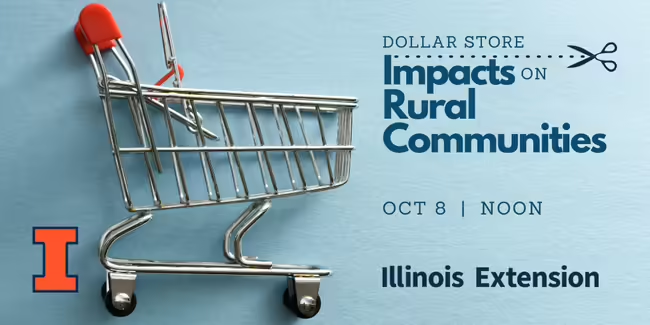
Dollar store impacts on rural Illinois communities
Local officials, economic development professionals, and planning commissions are invited to explore both short and long-term implications that dollar stores have on rural economies. New dollar store development in rural communities does not always equate to long-term economic health and can lead to an economic decline in already stressed rural regions.
The number of Dollar General, Dollar Tree, and Family Dollar stores has expanded dramatically, bucking the trend of the retail apocalypse, which has restructured and forced the closure of many brick and mortar retail store chains over the past two decades. In 2000, there were 4,294 Dollar General Stores in the United States, with 203 of those in Illinois.
By 2017, the number of Dollar General Stores had expanded to 14,609 nationally, with 481 of those in Illinois. Dollar General store expansion is particularly relevant to rural stakeholders, because unlike Family Dollar and Dollar Tree stores, which have expanded mostly in urban and suburban markets, Dollar General stores have also expanded significantly in rural communities.
Presenters will describe the expansion of dollar stores in Illinois, provide a market profile of communities that host Dollar General stores, explore the profile of consumers who shop at these kinds of stores, and examine positive and negative impacts these stores have on rural Illinois communities.
PRESENTERS:
Adee Athiyaman is a professor of marketing at Western Illinois University. with a PhD in marketing strategy from the AACSB/EQUIS/AMBA accredited Faculty of Business, Hong Kong Polytechnic University. His publication record includes 79 refereed papers, and more than 80 consultancy reports, book chapters, and working papers; this record is built on four factors: an ability to pick crucial research problems, ability to translate theory into empirical investigations, skills in developing innovative analytical methods, and the ability to work in several research areas simultaneously: marketing, applied mathematics, and data science. His research spans both traditional topics such as strategic planning to contemporary topics such as place branding, real-time tracking of consumer behavior and big data analysis, such as the workshop he conducted at the Indian Institute of Management, Bangalore.
His present faculty position with the Illinois Institute for Rural Affairs (IIRA) involves directing/conducting research into issues that affect non-metropolitan businesses. Similarly, in his previous position as director of the Center for Business & Economic Research, James Cook University, Australia, Adee engaged with organizations such as Advance Cairns, Cairns Regional Economic Development Corporation, and Queensland Tourism to ensure that business processes are conditional on maintaining the region's life support systems and living resources. These interactions with industry have resulted in his securing more than a million dollars in research funding from public and private sector businesses, as well as placing graduates in businesses across the Midwest region. Adee has served as head of marketing and international business, University of Western Sydney, Australia, and as head of management and marketing program, James Cook University, Australia.
Christopher D. Merrett is director and professor at the Illinois Institute for Rural Affairs (IIRA) at Western Illinois University. As IIRA director, Merrett oversees a university-based research, outreach, teaching, and policy development unit comprised of 20 community development faculty and professionals. In addition to his management role, he teaches courses in Principles of Community Development, Non-metro Planning, and Philosophy and History of Geography. He also serves on the Governor’s Rural Affairs Council, is current chairperson of Rural Partners, and has raised over $6 million in external grant funding to support community and economic development outreach and research. His current research focuses on cooperatives and community development. Merrett co-edited two books on this topic, including "A Cooperative Approach to Local Economic Development" (2001) and "Cooperatives and Local Development: Theory and Applications for the 21st Century" (2003).
University of Illinois Extension provides equal opportunities in programs and employment. If you need a reasonable accommodation to participate, please contact organizer Nancy Ouedraogo. Early requests are strongly encouraged to allow sufficient time to meet your needs.